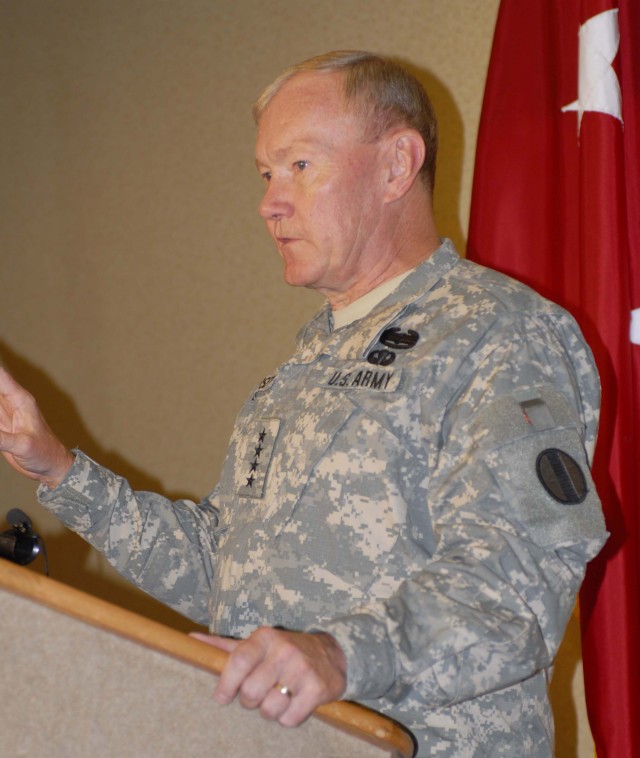The Army wants Soldiers to develop the attributes that will allow them to anticipate changes on the battlefields in Afghanistan and Iraq, the U.S. Army Training and Doctrine Command's commanding general said.
GEN Martin E. Dempsey addressed training at Fort Benning and around the service while attending the Summer 2009 TRADOC Initial Entry Training Forum Sept. 1-2 at the Columbus Iron Works and Trade Center.
"We're trying to decide how to build in new skill sets for our leaders to meet the hybrid threats that exist in these uncertain times," Dempsey said. "The pace of change adds to the increasing complexity ... We're seeking creative thinking skills and trying to replicate those complexities in our training scenarios. We want to build on the ability to adapt."
The 198th Infantry Brigade hosted the forum, which brought together officials from all commands where initial entry training Soldiers attend basic training - Fort Benning, Fort Jackson, S.C., Fort Sill, Okla., Fort Leonard Wood, Mo., and Fort Knox, Ky.
Army training center representatives gather about twice a year to review tasks and seek out ways to improve training and achieve consistency, said COL Daniel Kessler, the 198th Infantry Brigade commander.
He said many discussions this time centered on marksmanship instruction and outcomes-based training, which is aimed at cultivating Soldier adaptability.
"They need to be able to take what they know and literally use it to work their way through any problem, regardless of the situation they get placed into," Kessler said. "We want to give the Soldier a set of skills to be able to solve problems within his level of responsibility."
Under a Fort Benning initiative, Soldiers in the IET environment go through combat familiarization fire, he said. The program places trainees in a simulated combat environment and forces them to combine all the marksmanship skills necessary for success in combat today.
Kessler said it presents Soldiers with multiple scenarios and numerous targets, forcing an individual to identify the most dangerous threat. Trainers also will randomly insert "dummy rounds" within a magazine to cause weapon malfunctions.
"(A Soldier) could be firing and suddenly have to deal with that and continue to engage the enemy," he said. "He has to make decisions on what cover he will use and when to change magazines ... It is a very good example of an outcomes-based training environment that forces the Soldier to solve problems and be adaptive."
At the forum, TRADOC medical officials talked about health-related issues for basic trainees such as heat-injury prevention and the proliferation of the H1N1 flu virus outside the Army, Kessler said.
"We're always looking at ways to prevent flu and potentially a spread of the flu virus within the basic training world," he said. "As you can image, with 60 guys living in a bay, it's like a petri dish at times. We do a lot of prevention against infections."
Kessler said the conference produced good collaboration and sharing of best practices.
"We're developing connections with brigade commanders at other training centers - all in the spirit of partnership and building a better team," he said.
Dempsey said the Army has changed its approach to training and carrying out missions in Iraq and Afghanistan. Since the early days of the conflicts, the focus has shifted dramatically at the tactical level, he said.
"We've made some enormous changes to try to push the capabilities required to small-unit leaders because this kind of conflict is really more about small-unit leaders than it is about senior leaders," he said.
The four-star general said the Army must continue molding Soldiers for the drastically different environments they'll face on both fronts in the war on terror. He called Fort Benning a "center of excellence for small-unit tactics and marksmanship" and a key player in that effort.
"The question comes back to ... are we giving them the right skills'" Dempsey said.
Dempsey became TRADOC commander last December after serving as acting head of U.S. Central Command from March to October 2008.
"We are faced with unique challenges today," Dempsey said. "We have to make sure we make best use of the time and resources available to ... (forge) a consistent way forward."


Social Sharing